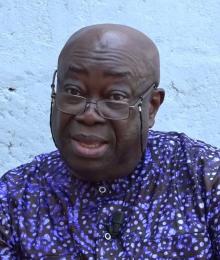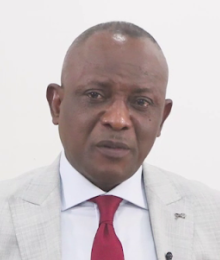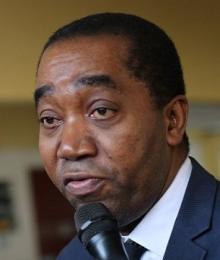
Mamoudou Babila Keita is a renowned Guinean investigative journalist known for his meticulous work on corruption and governance in Guinea. As the administrator of the news site Inquisiteur.net and a journalist for Hadafo Media, he has led several high-profile investigations, particularly into public procurement and the management of state resources. His most notable investigation, published in 2024, exposed allegations of corruption at the Ministry of Justice, leading to legal proceedings, a defamation conviction, and a six-month suspension by the Haute Autorité de la Communication (HAC).
Following an attempted arrest in Kankan in July 2024, which he narrowly escaped, Keita was forced to flee, highlighting the risks faced by investigative journalists in Guinea. He is particularly known for his sharp criticism of the Comité National du Rassemblement pour le Développement (CNRD) and his questioning of the true motivations behind the coup d'état of September 5, 2021. Despite threats and persecution, he remains committed to transparency and democracy. Currently, the journalist lives in exile somewhere in the world.
Introduction
Mamoudou Babila Keita is a Guinean investigative journalist known for his in-depth investigative work and commitment to transparency. As the administrator of the news site Inquisiteur.net and a journalist for Hadafo Media, he has gained recognition for his investigations into corruption and governance in Guinea, particularly during the political transition following the coup d'état of September 5, 2021.
Education and Early Career
Information about Mamoudou Babila Keita's academic background and early professional experiences is limited. However, his career demonstrates a strong command of investigative journalism and an in-depth understanding of governance mechanisms and administrative procedures in Guinea. His work has been marked by a steadfast dedication to transparency and the fight against corruption.
Journalistic Career
As the administrator of Inquisiteur.net and a journalist at Hadafo Media, Mamoudou Babila Keita has earned a reputation as a meticulous investigative journalist. His work is characterized by in-depth investigations into the management of public resources and governance practices in Guinea. He has particularly distinguished himself through his investigations into public procurement and alleged corruption within various government institutions.
One of his most notable investigations focused on the presidency and the Palais du Peuple, followed by inquiries into the Haute Autorité de la Communication (HAC) and the Ministry of Justice. His investigative approach relies on a strong network of sources and thorough analysis of administrative documents, especially in the area of public contracts.
The Ministry of Justice Case
In 2024, Mamoudou Babila Keita published an investigation titled "Scent of Corruption at the Ministry of Justice," which led to a series of legal proceedings. In this investigation, he highlighted alleged irregularities in the awarding of public contracts, particularly involving four companies, some of which he claimed were not registered with the relevant authorities (APIP, tax services).
This publication led to two separate lawsuits initiated by former Minister of Justice Alphonse Charles Wright. The first, before the Mafanco Court, was based on accusations of defamation. The second, before the Kaloum Court, involved allegations of complicity in insults, blackmail, threats, and moral harassment.
Trials and Sanctions
On June 20, 2024, Mamoudou Babila Keita appeared before the Mafanco Correctional Court. During the hearing, he maintained his accusations and defended the legitimacy of his investigative work. His lawyer, Me Sidiki Bérété, attempted to invoke Article 63 of the anti-corruption law, which, according to him, protects journalists who expose cases of corruption.
On July 8, 2024, the Mafanco Court delivered its verdict: Babila Keita was found guilty of defamation and fined 3 million Guinean francs. The court also ordered the removal of the incriminated article within five days and required the publication of the judicial decision in a newspaper chosen by the plaintiff.
Alongside these legal proceedings, the Haute Autorité de la Communication (HAC) suspended Mamoudou Babila Keita and his site Inquisiteur.net for six months, arguing that the journalist had failed to provide sufficient evidence for his corruption allegations.
Attempted Arrest and Exile
On July 23, 2024, while staying in Kankan after leaving N'zérékoré, Mamoudou Babila Keita narrowly escaped an attempted arrest. Around 5 p.m., alerted by a security source, he managed to evade uniformed men trying to apprehend him. He was forced to abandon his car and personal belongings to ensure his safety.
This attempted arrest occurred in a context where the journalist had been participating in debates with young leaders about Guinea's political transition, particularly criticizing corruption and public fund misappropriation. He had been openly critical of the Comité National du Rassemblement pour le Développement (CNRD) and its management of the transition.
Currently, the journalist lives in exile somewhere in the world.
Commitment and Political Perspective
Mamoudou Babila Keita's writings reflect a deep commitment to democracy and good governance in Guinea. In his analyses, he questions the true motivations behind the coup d'état of September 5, 2021, suggesting that the putschists' stated reasons conceal more complex interests.
He is particularly critical of the transition's management, highlighting what he perceives as contradictions between the initial promises and the actions of the CNRD. His questions focus on human rights, freedom of expression, and transparency in public affairs management.
Personal Life
Little is known about Mamoudou Babila Keita's private life from available sources. However, it is known that he maintains close ties with his family, as evidenced by his presence with his father during a surgical intervention and his stay in the interior of the country following his mother's return from the pilgrimage to Mecca.
Conclusion
Mamoudou Babila Keita's journey illustrates the challenges faced by investigative journalists in Guinea. His case raises important questions about press freedom, the right to information, and the boundaries of journalistic expression in the country. Despite legal actions and intimidation attempts, he remains committed to transparency and the fight against corruption, paying a high personal price for his investigative work.
His story highlights the tensions between investigative journalism and political power, as well as the risks faced by media professionals who tackle sensitive issues. It also emphasizes the importance of the debate on balancing press freedom and protection against defamation in the Guinean context.






















